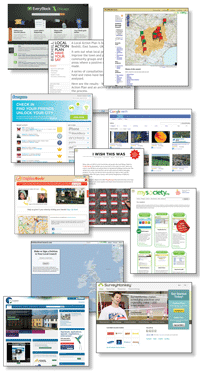- description
- uses
- more detail
The internet allows people to engage from the comfort of their own homes or offices at times convenient for them.
People are mostly free to remain anonymous if they wish but do not have to do so.
Websites provide a cost effective way of providing access to data and archives. This is particularly useful for planning which is frequently a long and complex process.
It is still early days and new and innovative ways of engaging people using the internet are constantly being developed.
Some tools have been developed on the internet specifically for community planning. But there is also huge scope for using tools developed for other purposes to make community planning more efficient and effective.
NWA composite of websites mentioned in more detail in the next tab.

Some of the internet pages useful for community planning
There were over 15 billion freely accessible pages on the internet in 2011.
with links to further information or examples
Brainstorming
Generating ideas and patterns. Mindmapping.
e.g. bubbl.us/
Campaigning
Securing support for a particular viewpoint or campaign
e.g www.petitionyourcouncil.com/
e.g www.avaaz.org
Communicating
Making presentations, booklets, newsletters
e.g. prezi.com
e.g. www.sliderocket.com
e.g. www.lulu.com
Development control
Allowing people to view and comment on planning applications and policy
e.g. www.planningportal.gov.uk
Event organising and scheduling
e.g. www.doodle.com
e.g. www.eventbrite.com
Fundraising
Raising funds for a project or initiative
e.g. www.kickstarter.com
Gaming
General awareness raising of planning and development through simulation
e.g. www.whatsthehubbub.nl/projects/koppelkiek/
e.g. www.citycreator.com
e.g. www2.citiesxl.com
Historical research
Finding out how a place developed and is now
e.g. www.visionofbritain.org.uk
e.g. data.london.gov.uk/
Local networking
Social media websites encouraging interaction at a local level.
e.g. www.foursquare.com
e.g. www.everyblock.com
e.g. www.neighborgoods.net
e.g. www.meetup.com
Maintenance
Providing ways for the public to report local maintenance issues to the relevant authorities.
e.g. www.fixmystreet.com/
e.g. www.green-space.org.uk/greenstat/index.php
Mapping
Plotting information on maps, often using Geographical Information Systems (GIS)
e.g. mapkibera.org/
e.g. www.police.uk
e.g. wikimapia.org
e.g. www.rightmove.co.uk
e.g. www.openstreetmap.org/
e.g. whoownsmyneighbourhood.org.uk/
See Electronic map (Featured Method)
Media sharing
Sharing photos, film, powerpoint presentations
e.g. www.flickr.cpm
e.g. www.youtube.com
e.g. www.slideshare.net
e.g. www.audioboo.fm
Method sites
Websites set up to promote a single method
e.g. www.placecheck.info
e.g. www.iwishthiswas.com
Modelling
3D visualisations helping people comprehend proposals and respond to them.
e.g. www.youcanplan.co.uk
Neighbourhood websites
Community websites can provide valuable information about an area and help get people involved.
more: talkaboutlocal.org.uk/how-set-wordpress/
e.g. peckhampower.org/
e.g. http://brag.btck.co.uk/
e.g. www.kingscrossenvironment.com/
e.g. www.chiswickw4.com/
Organising
Project management and personal organisation
e.g. www.basecamphq.com
e.g. www.huddle.com
e.g. www.woobius.com
e.g. www.dipity.com
e.g. www.evernote.com
e.g. www.rememberthemilk.com
Project consultation
Providing online information about a project and obtaining feedback
see: Online consultation (featured Method)
Project websites
Creating a website for a project to provide information and an archive of material.
e.g. www.bexhilllocalactionplan.co.uk/
e.g. millenniumpark.wordpress.com/
e.g www.forcem.co.uk
Social media
For generating interest, promoting events, getting feedback
(Most useful Facebook, Twitter, Linked In)
www.facebook.com
www.twitter.com
www.linkedin.com
Stakeholder identification
Finding out which organisations exist in an area and how to contact them.
e.g. www.groupsnearyou.com/
Surveys
Conducting surveys and producing reports on the results
e.g. www.surveymonkey.com
e.g. freeonlinesurveys.com
Toolkits
Accessing good practice toolkits and resources
e.g. www.communityplanning.net
e.g. www.peopleandparticipation.net
e.g. www.participatedb.com
Viewing property
Viewing maps and photographs of property
e.g. earth.google.com
e.g. maps.google.com/help/maps/streetview/
e.g. http://www.streetmap.co.uk
Note: This categorisation is a work in progress. The effectiveness of some of the examples listed has not been verified. All feedback especially appreciated. Site Editor, 2011
- The internet is a hugely important resource for community planning but is rarely a substitute for gaining and sharing practical experience on the ground or for face-to-face community engagement.
- Do not assume everyone has internet access or feels comfortable using it. Ensure there are alternative ways of engaging.
- Jump in feet first. Many internet tools are daunting and it is often hard to find people who can help you use them. The best way to learn is to experiment.
- Remember that many people access the internet through phones and other mobile devices
- Very cost effective way of engaging with people unless you have to pay for hardware, software or technical expertise.
-
www.project.net
Project summary - home page
In pictures
History
Events
Background documents
Consultation results
Contacts and credits
Get involved
-
"Information technology offers new potential for citizen participation in urban planning. The essential tasks to achieve with the use of new media are: providing a communication platform which suppresses a barrier of non-professionalism, allowing for distant contacts and enabling participatory process management."
This page funded by the Building Community Consortium.